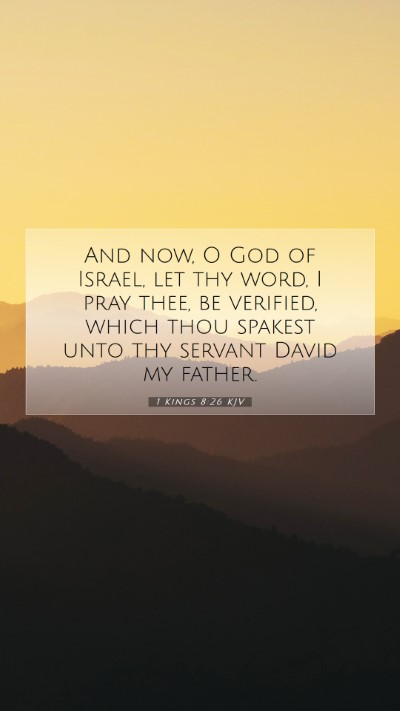Understanding 1 Kings 8:26
1 Kings 8:26 states: “And now, O God of Israel, let your word be verified, which you have spoken to your servant David, my father.”
This verse is part of Solomon’s prayer during the dedication of the Temple, expressing a deep desire for God to fulfill the promises made to David. In examining this verse, we can draw insights from various public domain commentaries, providing a rich tapestry of Bible verse meanings and Bible verse interpretations.
Commentary Insights
-
Matthew Henry’s Commentary:
Matthew Henry highlights Solomon's acknowledgment of God’s faithfulness to His word. He emphasizes that God's promises are steadfast and that Solomon's plea reflects a profound trust in God’s covenant. Henry notes that this statement not only acknowledges God’s past faithfulness but also entreats Him to manifest His glory through the fulfillment of His word.
-
Albert Barnes’ Notes:
Barnes elaborates on the significance of Solomon invoking God's promises. He points out that Solomon is not just praying for the Temple but also seeking assurance that God’s word, spoken to David, continues to hold weight and will be realized. This statement reinforces the idea of God's promises being interwoven into the fabric of Israel's identity and heritage, and addresses the importance of Bible verse commentary in understanding the continuity of God’s plan.
-
Adam Clarke’s Commentary:
Clarke discusses the context of this request, stating that Solomon’s prayer is both personal and national. He stresses the notion that as the leader of Israel, Solomon’s faith hinges on the belief that God will remain with His people as He promised. Furthermore, Clarke notes that the phrase ‘let your word be verified’ is a plea for the Lord’s actions to align with His declarations, an essential aspect of Biblical exegesis and Bible study insights.
Theological Implications
The plea for God to verify His word underscores a key principle in Scripture analysis: God as a promise-keeper. This verse shows Solomon's understanding of historical covenants and frames the human experience within the divine promise. For many believers, this assurance reinforces faith and serves as an anchor during times of uncertainty.
Application in Daily Life
The verse also presents an opportunity for Bible study groups and individuals to reflect on God’s promises in their own lives. Believers can contemplate how God has fulfilled His word historically, and in what ways His promises manifest today. This reflection can aid in applying Bible verses to daily life where individuals seek reassurance in God’s faithfulness and commitment to their personal circumstances.
Related Bible Verses
- 2 Samuel 7:12-16: God's covenant with David.
- Psalm 89:34: God's assurance that He will not break His covenant.
- Isaiah 55:11: The promise that God's word will not return void.
Conclusion
In summary, 1 Kings 8:26 serves as an essential declaration of faith, intertwined with themes of divine promise, leadership responsibility, and collective national identity. For those engaged in online Bible study or utilizing Bible study tools, understanding this verse enhances the appreciation of God’s unwavering commitment to His people throughout history and into modernity.
In your Bible study lessons, consider focusing on the ways God's promises are visible today and how they align with the truths found within the Scripture.


